Mercedes C-Class Wagon vs VW Tiguan - Differences and prices compared
Compare performance (680 HP vs 272 HP), boot space and price (42400 £ vs 33300 £ ) at a glance. Find out which car is the better choice for you – Mercedes C-Class Wagon or VW Tiguan?
Costs and Efficiency:
Looking at overall running costs, both models reveal some interesting differences in everyday economy.
VW Tiguan has a clearly perceptible advantage in terms of price – it starts at 33300 £ , while the Mercedes C-Class Wagon costs 42400 £ . That’s a price difference of around 9142 £.
Fuel consumption also shows a difference: Mercedes C-Class Wagon manages with 0.40 L and is therefore significantly more efficient than the VW Tiguan with 1.40 L. The difference is about 1 L per 100 km.
As for electric range, the VW Tiguan performs to a small extent better – achieving up to 126 km, about 14 km more than the Mercedes C-Class Wagon.
Engine and Performance:
Power, torque and acceleration are the classic benchmarks for car enthusiasts – and here, some clear differences start to show.
When it comes to engine power, the Mercedes C-Class Wagon has a clearly edge – offering 680 HP compared to 272 HP. That’s roughly 408 HP more horsepower.
In acceleration from 0 to 100 km/h, the Mercedes C-Class Wagon is decisively quicker – completing the sprint in 3.40 s, while the VW Tiguan takes 5.90 s. That’s about 2.50 s faster.
In terms of top speed, the Mercedes C-Class Wagon performs a bit better – reaching 280 km/h, while the VW Tiguan tops out at 242 km/h. The difference is around 38 km/h.
There’s also a difference in torque: Mercedes C-Class Wagon pulls clearly stronger with 1020 Nm compared to 400 Nm. That’s about 620 Nm difference.
Space and Everyday Use:
Whether family car or daily driver – which one offers more room, flexibility and comfort?
Both vehicles offer seating for 5 people.
In curb weight, VW Tiguan is slight lighter – 1599 kg compared to 1755 kg. The difference is around 156 kg.
In terms of boot space, the VW Tiguan offers distinct more room – 652 L compared to 490 L. That’s a difference of about 162 L.
In maximum load capacity, the VW Tiguan performs minimal better – up to 1650 L, which is about 140 L more than the Mercedes C-Class Wagon.
When it comes to payload, Mercedes C-Class Wagon barely noticeable takes the win – 565 kg compared to 533 kg. That’s a difference of about 32 kg.
Who comes out on top?
Overall, the Mercedes C-Class Wagon shows itself to be is largely superior and secures the title of DriveDuel Champion.
It convinces with the more balanced overall package and proves to be the more versatile choice for everyday use.
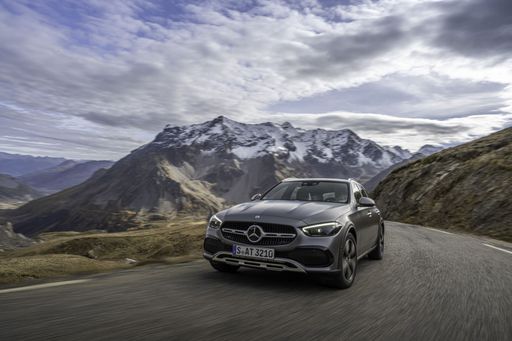
Mercedes C-Class Wagon
Costs and Consumption
View detailed analysis
Engine and Performance
View detailed analysis
Dimensions and Body
View detailed analysis
Mercedes C-Class Wagon
The Mercedes C-Class wagon dresses Mercedes refinement in a sensible, practical package, marrying a sleek estate silhouette with a plush, high-quality cabin that feels more premium than its badge implies. It quietly soaks up motorway miles and cartloads of family kit with composed handling and effortless comfort — a clever alternative to an SUV for buyers who still like to steer.
details
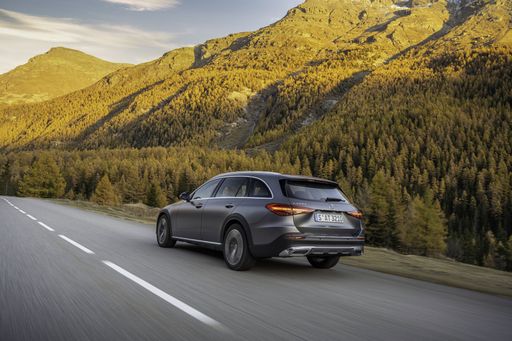
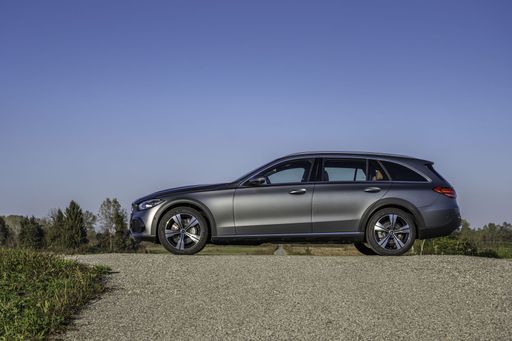
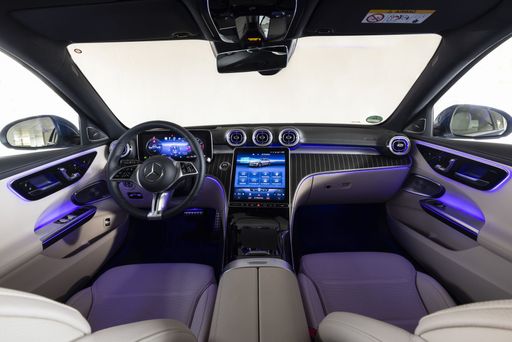
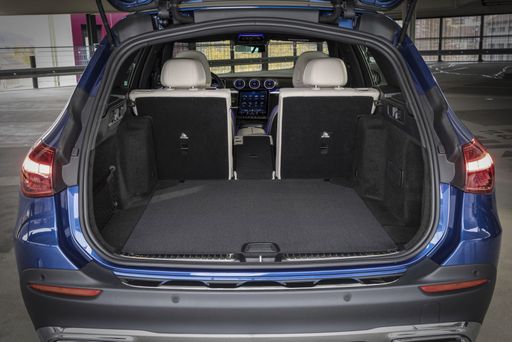
VW Tiguan
The VW Tiguan blends sensible family practicality with a dash of German polish, delivering a calm, reassuring ride and a cabin that never feels like an afterthought. For buyers who want an SUV that’s easy to live with yet still nicely dressed, the Tiguan is the grown‑up choice that keeps a cheeky wink in reserve.
details





Costs and Consumption |
|
|---|---|
|
Price
42400 - 115300 £
|
Price
33300 - 51900 £
|
|
Consumption L/100km
0.4 - 9 L
|
Consumption L/100km
1.4 - 8.4 L
|
|
Consumption kWh/100km
-
|
Consumption kWh/100km
-
|
|
Electric Range
11 - 112 km
|
Electric Range
118 - 126 km
|
|
Battery Capacity
19.50 kWh
|
Battery Capacity
19.70 kWh
|
|
co2
11 - 206 g/km
|
co2
32 - 190 g/km
|
|
Fuel tank capacity
40 - 66 L
|
Fuel tank capacity
45 - 58 L
|
Dimensions and Body |
|
|---|---|
|
Body Type
Estate
|
Body Type
SUV
|
|
Seats
5
|
Seats
5
|
|
Doors
5
|
Doors
5
|
|
Curb weight
1755 - 2235 kg
|
Curb weight
1599 - 1890 kg
|
|
Trunk capacity
360 - 490 L
|
Trunk capacity
490 - 652 L
|
|
Length
4751 - 4842 mm
|
Length
4539 mm
|
|
Width
1820 - 1900 mm
|
Width
1842 - 1859 mm
|
|
Height
1454 - 1494 mm
|
Height
1656 - 1658 mm
|
|
Max trunk capacity
1375 - 1510 L
|
Max trunk capacity
1486 - 1650 L
|
|
Payload
440 - 565 kg
|
Payload
460 - 533 kg
|
Engine and Performance |
|
|---|---|
|
Engine Type
Petrol MHEV, Plugin Hybrid, Diesel MHEV
|
Engine Type
Petrol, Petrol MHEV, Diesel, Plugin Hybrid
|
|
Transmission
Automatic
|
Transmission
Automatic
|
|
Transmission Detail
Automatic Gearbox
|
Transmission Detail
Dual-Clutch Automatic
|
|
Drive Type
Rear-Wheel Drive, All-Wheel Drive
|
Drive Type
All-Wheel Drive, Front-Wheel Drive
|
|
Power HP
186 - 680 HP
|
Power HP
130 - 272 HP
|
|
Acceleration 0-100km/h
3.4 - 8.8 s
|
Acceleration 0-100km/h
5.9 - 10.6 s
|
|
Max Speed
226 - 280 km/h
|
Max Speed
210 - 242 km/h
|
|
Torque
250 - 1020 Nm
|
Torque
220 - 400 Nm
|
|
Number of Cylinders
4
|
Number of Cylinders
4
|
|
Power kW
137 - 500 kW
|
Power kW
96 - 200 kW
|
|
Engine capacity
1496 - 1999 cm3
|
Engine capacity
1498 - 1984 cm3
|
General |
|
|---|---|
|
Model Year
2024 - 2025
|
Model Year
2024 - 2025
|
|
CO2 Efficiency Class
E, F, G, B, D
|
CO2 Efficiency Class
G, D, E, F, B
|
|
Brand
Mercedes-Benz
|
Brand
VW
|
Is the Mercedes C-Class Wagon offered with different drivetrains?
The Mercedes C-Class Wagon is available as Rear-Wheel Drive or All-Wheel Drive.




